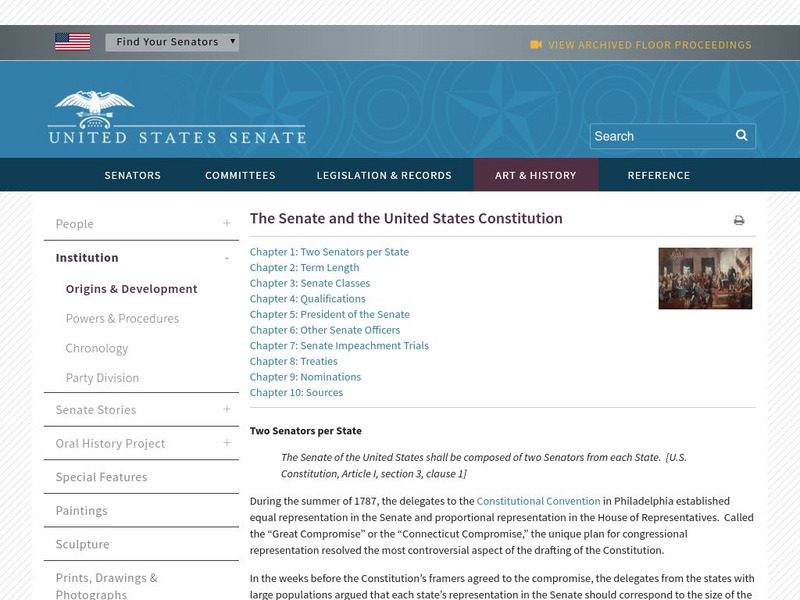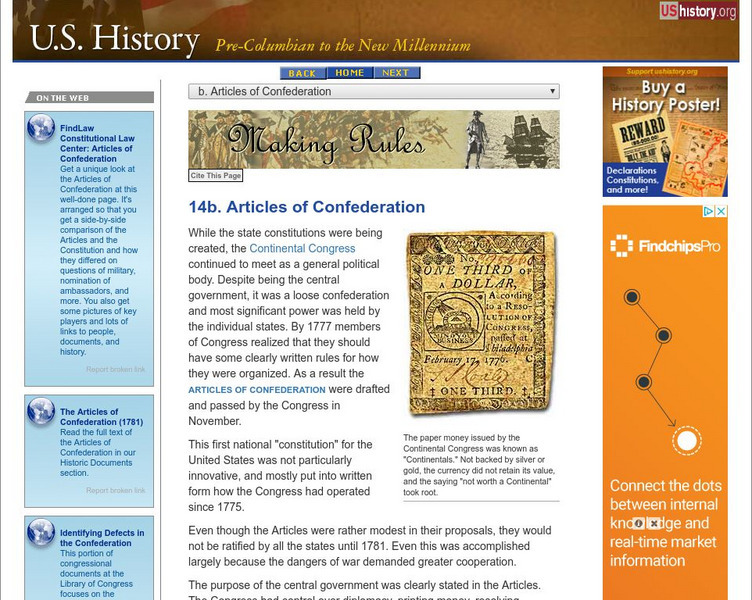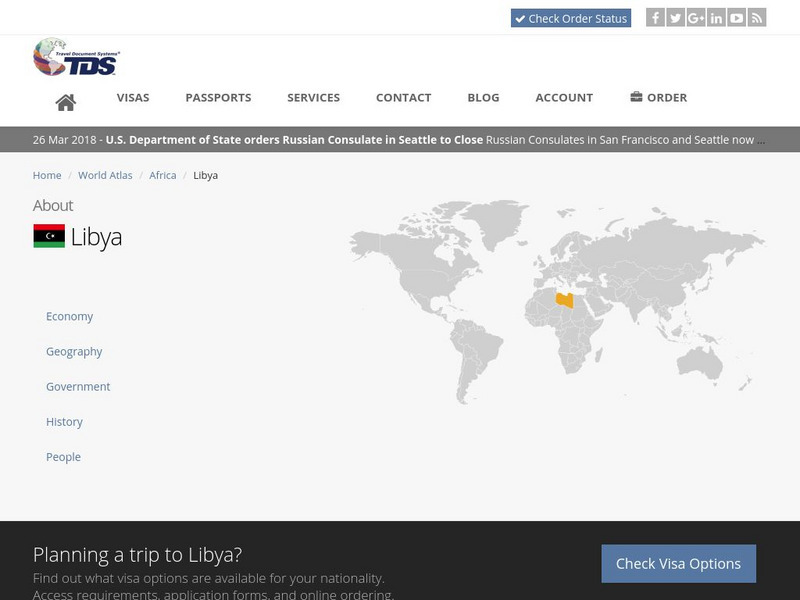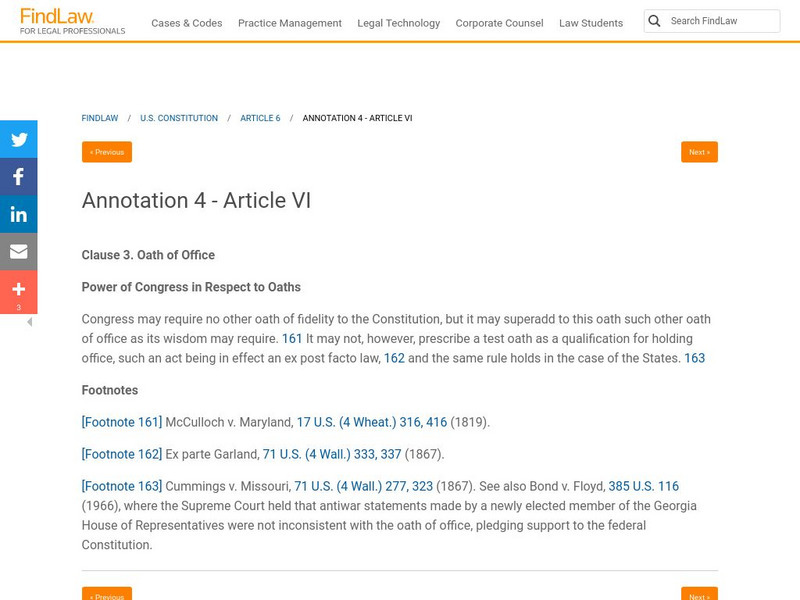US Government Publishing Office
Ben's Guide to u.s. Government: Learning Adventures: How Laws Are Made: The Language of the Law
Learning Adventures from Bensguide summarizes the process of lawmaking outlined in the U.S. Constitution and provides links to a glossary of legislative terms and Congressional Resolution from 2003.
This Nation
This nation.com: u.s. Supreme Court: Buckley v. Valeo, 424 u.s. 1 (1976)
This appeal filed in the U.S. Supreme Court describes the expressed powers of Congress to oversee the elections of President, Vice-President and Congress.
Other
U.s. House of Representatives
The official site for the U.S. House of Representatives. Includes everything you want to know about it! Examples: the schedule of the House for the week, current events, committee hearings, roll call votes. Find your Representative.
PBS
Structure of Congress and the Legislative Process Lesson
This lesson explores the structure of Congress and the legislative process. There is an introduction, a research activity, an assessment, and a role play activity.
The Dirksen Congressional Center
Congress Link: Lesson Plans
The Dirksen Congressional Center provides abundant lesson plans on all aspects of the US Congress and the US Constitution. All lessons contain time frames, objectives, and links to material, and are built around Bloom's taxonomy.
A&E Television
History.com: How the u.s. Constitution Has Changed and Expanded Since 1787
Through amendments and legal rulings, the Constitution has transformed in some critical ways. The U.S. Constitution, written in 1787 and ratified by nine of the original 13 states a year later, is the world's longest-surviving written...
US Government Publishing Office
Ben's Guide to u.s. Government: Legislative Branch
This site designed for students, clearly describes congressional powers and provides excellent accompanying links.
Independence Hall Association
U.s. History: Alien and Sedition Acts
A great description of the Alien and Sedition Acts, passed by the Federalist Congress in 1798. See how the Federalists tried to hang on to power by restricting voting privileges and infringing on free speech and freedom of the press.
US Senate
The u.s. Senate: The Senate and the United States Constitution
This site from the United States Senate provides information about the evolution of the Senate as the Constitution was being written by the Constitutional Congress.
US National Archives
National Archives: Lesson Plans Congress, the President, and the War Powers
Examine the power of Congress to make war by studying primary source documents from various wars throughout U.S. history. Students will analyze how the balance of authority between the legislative branch and executive branch has changed...
Library of Congress
Loc: Herblock's Presidents
Historically significant collection of political cartoons featuring U.S. Presidents from Library of Congress online teacher-student resources.
US Government Publishing Office
Ben's Guide to u.s. Government: The Articles of Confederation, 1781
Gives a nice history of the Articles and also a summary of what they were and the problems that developed with their adoption. Includes links to the actual document.
Yale University
War Powers Act
This is the original text of the 1973 War Powers Resolution that requires the President to consult with Congress before committing U.S. troops abroad.
Other
U.s. House of Representatives: Appropriations Committee
This site is a listing of the Committees and Subcommittees on Appropriations from the House of Representatives 108th Congress.
Other
The Unconstitutionality of the Laws of Congress Prohibiting Private Mails
An exposition by Lysander Spooner on behalf of the American Letter Mail Company entered according to an Act of Congress in1844, asserting that the company should have the right to establish post offices in competition with those of...
Independence Hall Association
U.s. History: Articles of Confederation
During the Revolutionary War, it was necessary to put together some sort of central government, primarily to raise and pay an army. Read about the rules finally passed by Congress in 1777, called the Articles of Confederation. See what...
Thomson Reuters
Find Law: Annotation 36: Naturalization and Citizenship
This resource summarizes the meanings of the words naturalization and citizenship, using excerpts and references from the U.S. Constitution, and explains the power held by the U.S. Congress in granting citizenship.
C-SPAN
C Span Classroom: Teaching About Gridlock
Learning module and lesson plan with C-SPAN video resources and related articles for students to examine and deliberate on whether or not the President should exercise executive powers during times of Congressional gridlock.
The Dirksen Congressional Center
Congress for Kids: Checks and Balances
The system of checks and balances in place for maintaining the power relationships within the United States government is explained in kid-friendly terms. Suggestions for research projects, resource links and some activities are...
Discovery Education
Discovery Education: A Nation's Voice
A Nation's Voice is a lesson plan that uses internet sites, magazines and books, electronic encyclopedias and databases to understand the policy making of the U.S.
US National Archives
National Archives: The Constitution in Action: Article Ii
This activity can be used during a unit on the U.S. Constitution. Young scholars will analyze the Senate Journal of the First Congress and identify how the document demonstrates content contained within Article II of the Constitution in...
Thomson Reuters
Find Law: Article Vi
This resource provides links to papers written about Article VI of the U.S. Constitution. Sample topics include: Validity of Prior Debts and Engagements, Supremacy of the Constitution, National Supremacy, the Power of Congress in Respect...
Travel Document Systems
Tds: Libya: Government
An interesting look at the governmental system in Libya. Information is from the U.S. State Dept. Background Notes. Read about Moamar Qadhafi's concept of government and how it is being carried out.
Thomson Reuters
Find Law: Article Vi: Oath of Office
Read the words in the U.S. Constitution, Article VI, concerning the oath of office. Link to a Supreme Court case which tested the interpretation of this article, McCullock v. Maryland, to view the decisions of the Justices.
















